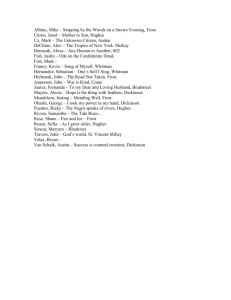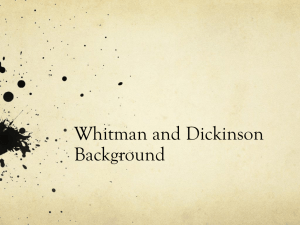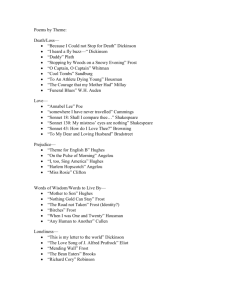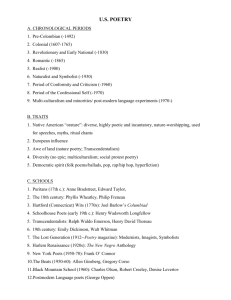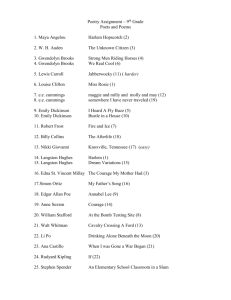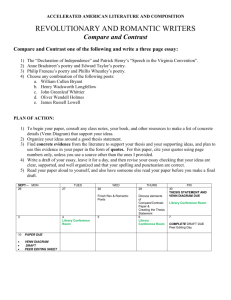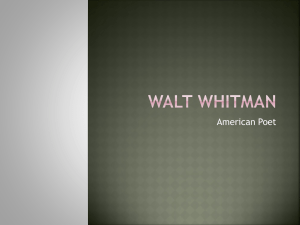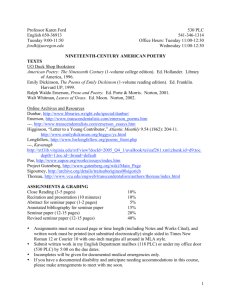American Poets
advertisement
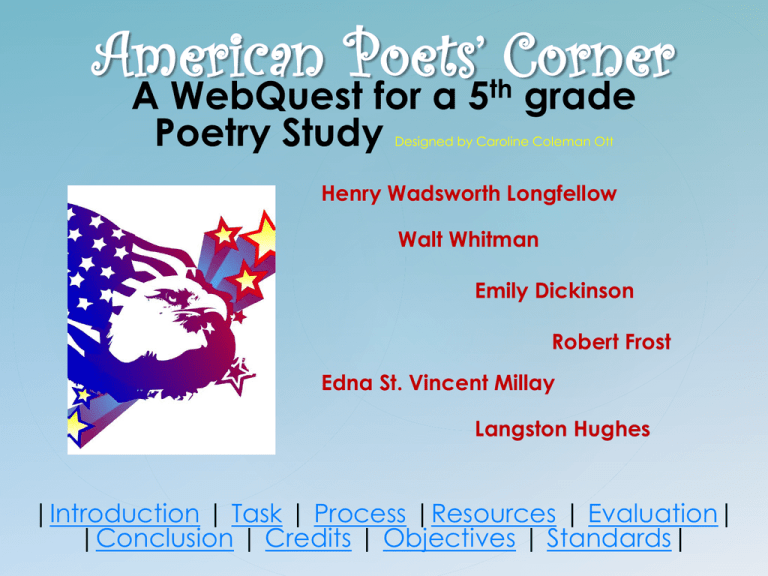
American Poets’ Corner
A WebQuest for a 5th grade
Poetry Study
Designed by Caroline Coleman Ott
Henry Wadsworth Longfellow
Walt Whitman
{
Emily Dickinson
Robert Frost
Edna St. Vincent Millay
Langston Hughes
|Introduction | Task | Process |Resources | Evaluation|
|Conclusion | Credits | Objectives | Standards|
Let’s begin our scavenger hunt:
We will be studying six well-known
American writers from the past.
All famous writers are studied for similar information.
We will be searching for this information:
birth & death place/year,
family information,
famous poem titles and topics,
difficult moments, and
how they are remembered.
The Task:
You will be completing
a scavenger hunt organizer
to record important
information about
famous American poets.
The Process:
Take the scavenger hunt organizer from the
literacy table or print one from this link: poet study guide.
2.
Search for the Poetry for Young People collection on the
shelves of the Lower School Library & locate
Longfellow, Whitman, Dickinson, Frost, Millay, and Hughes.
1.
(What other titles about these poets can you find and use?)
3.
4.
Follow the links on the resources slide.
Read, research, summarize, and record
the requested information on your organizer!
Resources:
Use the books and the following links to research each poet.
#1
Use this link to record information about Longfellow:
http://www.hwlongfellow.org/
#2
Use this link to record information about Whitman:
http://whitmanarchive.org/
#3
Use this link to record information about Dickinson:
http://www.poets.org/poet.php/prmPID/155
#4
Use this link to record information about Frost:
http://www.poets.org/poet.php/prmPID/192
#5
Use this link to record information about Millay:
http://www.millay.org/millays-life/
#6
Use this link to record information about Hughes:
http://www.scholastic.com/teachers/contributor/langston-hughes
Evaluation rubric:
___ 9 points: Longfellow
___ 15 points: Whitman
___ 11 points: Dickinson
___ 15 points: Frost
___ 12 points: Millay
___ 10 points: Hughes
____ 72 points total
(65-72 points=A; 58-64 points=B; 51-57 points=C)
Conclusion:
Poets are people with happy moments and
struggles like everyone.
Longfellow, Whitman, Dickinson,
Frost, Millay, and Hughes
were successful American poets
who created beautiful writing;
however, they also experienced sadness.
Events in their lives, both happy and sad,
shaped them as writers,
just as events in our lives affect us as writers.
Credits & References:
Web Quest Template: http://webquest.sdsu.edu/
Eagle clipart: www.office.com
“Yankee Doodle” audio: http://www.royaltyfreemusic.com/loops-formicrosoft.html?xc=MS900431081
Common Core Curriculum standards:
http://www.tncurriculumcenter.org/index.php?option=com_curriculum&controller=map
&task=strand&id=96&grade=5
Tennessee Standards:
http://www.tncurriculumcenter.org/english
http://state.tn.us/education/ci/english/doc/ENG_Grade_5.pdf
Books:
Dickinson, E., Schoonmaker, F., & Chung, C. (1994). Poetry for young people: Emily
Dickinson. New York: Sterling Pub. Co.
Frost, R., Schmidt, G. D., & Sorenson, H. (1994). Poetry for young people: Robert Frost.
New York: Sterling Publishers.
Hughes, L., Rampersad, A., Roessel, D. E., & Andrews, B. (2006). Poetry for young people:
Langston Hughes. New York: Sterling Pub.
Longfellow, H. W., & Schoonmaker, F. (1999). Poetry for young people: Henry Wadsworth
Longfellow. New York: Sterling Juvenile.
Millay, E. S. V., Schoonmaker, F., & Bryce, M. (1999). Poetry for young people:
Edna St. Vincent Millay. New York: Sterling Pub. Co.
Whitman, W., Levin, J., & Burke, J. (1997). Poetry for young people: Walt Whitman.
New York: Sterling Pub.
WebQuest’s Learning
Objectives:
GLE 0501.6.1 Apply appropriate skills and strategies to
comprehend informational texts(e.g., pre-reading strategies,
comprehension strategies, graphic organizers, questioning
text).
0501.6.2 Derive meaning while reading (e.g., use
metacognitive and self-monitoring reading strategies to
improve comprehension {reread, ask for help, self-questioning,
draw on earlier reading}).
0501.6.3 Check for understanding after reading (e.g.,
summarize, identify the author’s purpose).
WebQuest’s Curriculum Standards:
CU0601.4.18
Quote, paraphrase, or summarize text, ideas, or other
information taken from print or electronic sources.
CC RI.5.2
Determine two or more main ideas of a text and explain how
they are supported by key details; summarize the text.
WebQuest created by Caroline Coleman Ott
School Change and the Internet - IDT 7064
